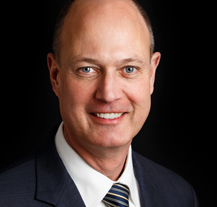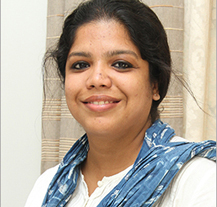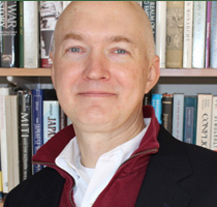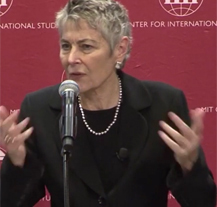Journalist Meera Srinivasan Joins CIS
The Center for International Studies at MIT announces that Meera Srinivasan, formerly a senior assistant editor with The Hindu, has been selected as the 2015/16 IWMF Elizabeth Neuffer Fellow. The fellowship is offered through the International Women's Media Foundation (IWMF) and is sponsored in part by CIS. The award provides a unique academic and professional opportunity for women journalists focusing on human rights and social justice reporting.
Beginning in August, Srinivasan will spend the seven-month fellowship as a research associate in residence at CIS. She will utilize the academic opportunity with MIT to pursue research and coursework on refugees and vulnerable communities. She will also complete journalism internships with The Boston Globe and The New York Times.
The fellowship was created in memory of Elizabeth Neuffer, The Boston Globe correspondent and 1998 IWMF Courage in Journalism Award winner. Neuffer died while reporting in Iraq on May 9, 2003. In collaboration with Neuffer's family and friends, the IWMF started this program to honor her legacy while advancing her work in the fields of human rights and social justice.
"We are thrilled to welcome Meera Srinivasan to MIT as a Elizabeth Neuffer Fellow," said Richard Samuels, director of the MIT Center for International Studies and Ford International Professor of Political Science. "Meera is a courageous journalist who, in the spirit of Elizabeth, works tirelessly to reveal social injustices that would otherwise be ignored. It is an honor to have her among us."
Srinivasan, based in Tamil Nadu, India, covers human rights pertaining to ethnic reconciliation, religious intolerance, and refugees in both Sri Lanka and her home country of India.
From 2013-2015, Srinivasan was posted to Sri Lanka as a foreign correspondent for The Hindu covering the country's post-war challenges. She has also reported extensively on the fisheries conflict in northern Sri Lanka.
"The fellowship is a fantastic opportunity for personal reflection on larger themes of human rights and social justice, that are critical to addressing class inequalities and discrimination reflected in vulnerable communities everywhere," Srinivasan said.
Srinivasan is the 11th journalist to win the fellowship. Since 2004, 10 journalists representing nine countries have been awarded the fellowship. Neuffer Fellows advance their reporting expertise while exploring a wide range of issues including gender-based violence, indigenous rights and freedom of speech. For more information about the fellowship, visit www.iwmf.org/neuffer.
Prominent East Asia Expert Joins CIS
The MIT Center for International Studies is pleased to announce the appointment of Dr. Eric Heginbotham, one of this country's foremost political-military analysts of East Asia, to the post of principal research scientist.
Heginbotham comes to MIT from the RAND Corporation, where he was a senior political scientist for ten years. He earned his PhD at MIT in 2002, winning the Lucian Pye Award for the best doctoral dissertation in the Department of Political Science that year, and has authored or co-authored numerous influential studies, including the U.S.-China Military Scorecard, just released by the RAND Corporation, and Chinese and Indian Strategic Behavior: Growing Power and Alarm, published by Cambridge University Press in 2012. He has also been a leading analyst of Japanese grand strategy. His appointment is supported by a generous gift to endowment received earlier this year from the Japanese Ministry of Foreign Affairs.
Richard J. Samuels, Ford International Professor of Political Science and director of CIS welcomes the appointment, declaring, "I have no doubt that Eric Heginbotham will continue to raise the bar for the study of Japanese foreign policy and for the understanding international security in the Asia-Pacific region, areas in which CIS and its Security Studies Program are already world leaders."
Recent National Intelligence Officer for East Asia Joins CIS

Paul Heer
Paul Heer, a recent National Intelligence Officer for East Asia, has been named a Robert E. Wilhelm fellow. Dr. Heer arrived to MIT in September 2015 and will be in residence at CIS for the 2015-2016 academic year.
Dr. Heer served as the National Intelligence Officer for East Asia—the senior analyst of East Asian affairs in the US Intelligence Community—in the Office of the Director of National Intelligence from 2007 to 2015. A career officer of the Central Intelligence Agency's Directorate of Intelligence, he began that career in 1983 as a political and foreign policy analyst on Southeast Asia before specializing on China as an analyst and analytic manager. He served on the staff of the President's Daily Brief, and as a member of the CIA's Senior Analytic Service and the Senior Intelligence Service. Dr. Heer was the Visiting Intelligence Fellow at the Council on Foreign Relations during 1999-2000 and was subsequently elected a Life Member of the Council.
He holds a B.A. degree from Loras College in Dubuque, Iowa; an M.A. in history from the University of Iowa, and a Ph.D. in diplomatic history from The George Washington University.
Dr. Heer will spend his time at MIT researching and writing on US relations with East Asia, both contemporary and historical, and Chinese political and foreign policy developments. He will also meet with faculty and students to discuss issues related to East Asia.
"It is an honor to welcome Paul to MIT. He will be bringing with him a wealth of knowledge in East Asian affairs that will greatly benefit the CIS community. We hope he finds his time here equally rewarding." said Richard Samuels, director of the Center for International Studies and Ford International Professor of Political Science at MIT."
A generous gift from Robert E. Wilhelm supports the Center's Wilhelm fellowship. The fellowship is awarded to individuals who have held senior positions in public life and is open, for example, to heads of non-profit agencies, senior officials at the State Department or other government agencies, including ambassadors, or senior officials from the UN or other multilateral agencies. Previous Wilhelm fellows include: Ambassador Barbara Bodine, Ambassador Frances Deng, Admiral William Fallon, and Yukio Okamoto, a former special advisor to the prime minister of Japan.
Facing the Global Refugee Crisis
by Peter Dizikes, MIT News Office | Originally published here
The millions of Syrian refugees displaced by their country's four-year civil war constitute a major tragedy—and could be a harbinger of even worse problems in the future, a group of scholars and relief workers suggested at an MIT forum on October 21, 2015.
To cope with such scenarios, the panelists suggested, governments, international organizations and other concerned groups will likely have to take an unblinking look at both the causes of forced migrations and the system of refugee aid that leaves huge numbers of displaced persons holed up in camps and other facilities for years at a time.
"This might well be the tip of the iceberg," Jennifer Leaning, a professor and director of the FXB Center for Health and Human Rights at the Harvard School of Public Health, said of the situation in Syria. Leaning is also a member of the Inter-University Committee on International Migration, a research group MIT hosts in its Center for International Studies (CIS).
As Leaning noted, the U.S. Committee for Refugees and Immigrants, a nonprofit group, estimates that about 60 million people are displaced around the world right now, a figure higher than the estimated 50 million people left displaced at the conclusion of World War II.
Most Syrians are fleeing the war that has shattered their country. But as Leaning noted, in most places, the world's displaced persons constitute "a great mixture of highly miserable people … coming for a variety of reasons." That reality is not easily accommodated by our political and legal systems, however, which are geared toward people seeking political asylum, but not necessarily those displaced by war, economic upheaval, and famine.
Leaning also cited Africa, where she has worked in multiple countries, as a place where increasing forced migration may occur for several reasons.
Indeed, in the view of Anna Hardman—a lecturer in economics at Tufts University and an organizer of MIT's work on migration, who moderated the event—we may be "uncomfortable choosing a single word" to describe displaced persons because we are trying to sort them into groups, such as either "refugees" or "migrants." Yet in reality those distinctions may be ill-suited to the many circumstances that force people to flee.
On the ground in Syria and beyond
Those circumstances were well documented at Wednesday's event, thanks to a pair of presentations from relief workers who have been on the ground in Syria, Iraq, and refugee camps in Europe, where many Syrian refugees have fled.
"It's just the consequence of desperation and hopelessness," said Nahuel Arenas, director of humanitarian response at Oxfam America, who has been working on the organization's response to the Syrian crisis. As he noted, 250,000 people have been killed in Syria, 1 million injured, and half the country's children no longer attend school.
Most fleeing Syrians have gone to Lebanon, Jordan, Turkey, and Iraq, but those countries have not been able to cope with a migration now numbering millions of people; Iraq is suffering "a humanitarian crisis of its own," as Arenas noted.
Ali Aljundi, a Syrian who is now a project officer for Oxfam in Syria, noted that the country's humanitarian crisis "didn't happen in one night," and that drought, agricultural struggles, and an economic downturn had exacerbated the country's problems even before the civil war started in 2011. Still, as he noted, "the regional conflict has played a particular role in this." Some of his own relatives have fled, he noted, and some remain displaced.
"The house we want to live in"
Wednesday's public discussion was part of CIS's Starr Forum series of events, in which experts discuss pressing issues in international politics and society.
The panelists contended that wealthier countries could be doing more to accommodate the current influx of refugees—and overestimate the extent to which refugees will stay in their borders.
Arenas emphasized that in his experience, refugees almost always want to return home. While presenting a series of photographs from his fieldwork, Arenas showed the audience a picture of two young Syrian refugees in a Serbian camp, constructing a small makeshift object out of sticks.
"We are building the house we want to live in when we go home," the boys told Arenas, when he asked what they were making.
However, that return might be a long time coming. Serena Parekh, an associate professor of philosophy at Northeastern University who has researched and written about refugees and human rights, noted that once people are displaced, it is common for them to spend 20 years in camps, with no alternative easily available.
"Most displaced people are going to live their lives as displaced people," Parekh said. "And we ought to treat them well."
The panelists did express some optimism that wealthier countries may change their attitudes toward refugees in the long run, and Aljundi emphasized that rebuilding Syria would be an important part of easing the refugee burden other countries are experiencing.
"As Syrians, please give us some hope that we will go back to rebuilding our country," Aljundi said.






